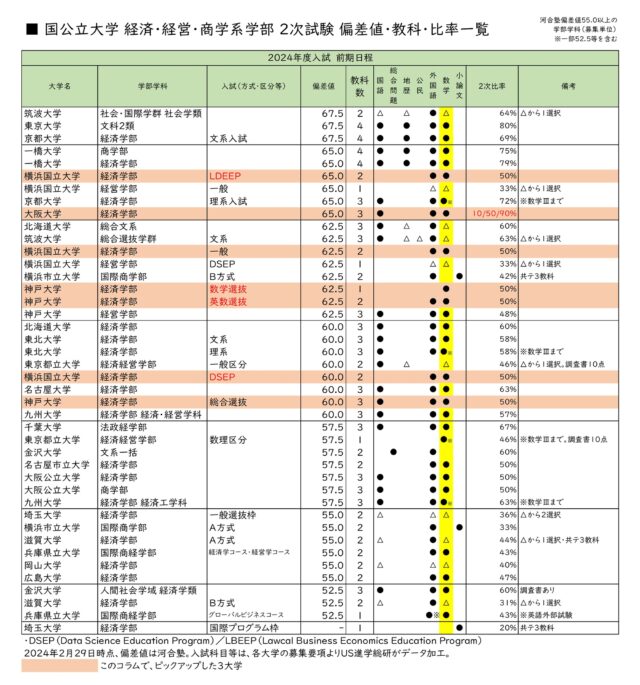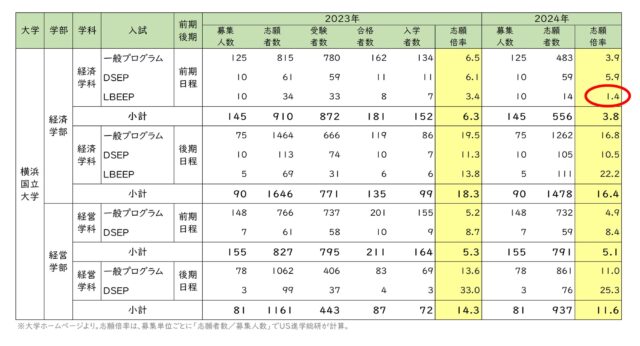In the first half of the 2024 entrance exams for national and public universities, there were 8 applicants against a capacity of 486 applicants, and the applicant ratio was 23 times, unchanged from last year. Even though the applicant ratio is 2344 times, there are some undergraduate departments where the ratio is over 2.9 times, and there are some where the ratio is 2.9 times. If you look at it normally, you would think that it is difficult to pass if the ratio is high, and it is easy to pass if the ratio is low, but there are some undergraduate departments where the true difficulty level cannot be determined just from this number.
This column is about Yokohama National University's Faculty of Economics, "LBEEP," which has a high deviation score and a low rate of results in the 2024 entrance exam in the "Faculty of Economics, Management, and Commerce system." Kobe University Faculty of Economics ``Mathematics Selection'' and ``English and Mathematics Selection'', which may be suitable for people who have strong biases in their strengths and weaknesses depending on the type of exam.Successful candidates for the first half of the General Selection at the Faculty of Economics, Osaka University. I would like to report on this.
Yokohama National University Faculty of Economics LBEEP's first term schedule is 1.4x application ratio? Can I pass this?
For the first half of the 2024 entrance exam, Yokohama National University Faculty of Economics LBEEP (Lawcal Business Economics Education Program), there are 10 applicants for the recruitment capacity of 14. Kawaijuku's deviation score is 65.0, so it may be that the number of applicants has decreased due to caution, but it is not true that it is easier to pass just because the application ratio is low. The reason for this lies in the way successful applicants are determined. The application requirements include the following details:
(a) Applicants can only apply for one program (general, DSEP or LBEEP). Applicants for all programs will be selected based on the same criteria, and successful candidates for the general program will be selected. Among the successful candidates, those who wish to take the DSEP will be selected from those with the highest score in the mathematics subject of the individual academic ability test, and those who wish to take the LBEEP will be selected from those who have the highest total deviation score on the common university entrance test and the individual academic ability test. will be selected. Therefore, even if you apply for DSEP or LBEEP, you may be accepted into the general program as a result of the selection process.
(b) It is not possible to change to another program after enrollment.
*As a result of the selection process for the Faculty of Economics DSEP/LBEEP, the number of successful applicants may not reach the number of applicants.
All those who applied for the Faculty of Economics will be selected as successful candidates for the general program, and those who wish to apply for LBEEP will be selected from among the successful candidates, and the successful candidates will be selected from those with the highest total deviation score on the common university entrance test and individual academic ability test. There is also a caveat that the number of successful applicants may be less than the number of applicants. If so, you can see that the difficulty level is quite high. Because of this method of determining successful applicants, the exact number is not 1.4 based on LBEEP, but unless the multiplier is shown as the first semester schedule for the Faculty of Economics, it will not be accurate. However, since the recruitment capacity is allocated and applicants are accepted separately from general, LBEEP, and DSEP, the ratio announced at cram schools will be 1.4 times LBEEP. On the university's website, only the ratio for the Faculty of Economics as a whole is listed.
Although Yokohama National University does not have a Faculty of Law, LBEEP offers a unique program that allows students to study law and political science in a comprehensive and practical manner in addition to economics subjects. Masu. You need to be aware that even if you get a high magnification, you can still pass the exam as a general exam.
Kobe University Faculty of Economics Application ratio for mathematics selection is 1.0x, and application ratio for alphanumeric selection is 0.7x? Can I pass this?
2024 Entrance Examination, Kobe University Faculty of Economics The first half of the ``Mathematics Selection'' has a low recruitment rate of 30 applicants out of a recruitment capacity of 30, and the ``English Mathematics Selection'' has a low recruitment rate of 30 applicants out of a recruitment capacity of 20. . The deviation score is higher than that of the "general selection" partly because there are fewer subjects to take the exam. However, just because the magnification is low doesn't mean it's easy to pass. The reason for this lies in the way successful applicants are determined. The application requirements include the following details:
Applications will be accepted for the ``First Semester Schedule'' in three categories: ``Mathematics Examination,'' ``Alphanumeric Examination,'' and ``Comprehensive Examination.'' Applicants choose one of three categories. Selection will be made through ``mathematics selection,'' ``alphanumeric selection,'' and ``general selection,'' depending on the subject you took the exam for.
1) If you select ``Mathematics Exam'', you will only take ``Mathematics (Arts)'' in the individual academic ability test, and will be considered for admission only in ``Mathematics Selection''.
2) If you select the "Alphanumeric and Mathematics Exam", you will take the "Mathematics (Humanities)" and "English" exams in the individual academic ability test, and will be subject to admission selection in the "Alphanumeric and Mathematics Selection". Please note that "general selection" does not apply to admission selection.
3) If you select the "Comprehensive Examination", you will take the "Mathematics (Arts)," "English," and "Japanese" tests in the individual academic ability test, and will be selected for admission in the "Comprehensive Selection," "English Selection," and "Mathematics Selection." It becomes.
4) If you do not take even one subject/subject of the individual academic ability test specified in each category, you will not be considered for admission in any selection process.
If you select "Comprehensive Examination," all of the "Comprehensive Entrance Examination," "Alphanumeric Entrance Examination," and "Mathematics Entrance Examination" will be eligible; however, if you select "English Entrance Examination," both of the "English Entrance Examinations" and "Mathematics Entrance Examinations" will be eligible. If you select "Mathematics selection", only "Mathematics selection" will be eligible. Because of this method of determining successful applicants, the correct notation will not be accurate unless the magnification is shown as the first-term schedule for the entire Faculty of Economics, rather than 1.0 times for Mathematics selection and 0.7 times for English Mathematics selection. . However, because the recruitment capacity is allocated and applicants are accepted separately from mathematics selection, alphanumeric selection, and general selection, the ratio of preparatory schools is displayed at a lower ratio. On the university's website, only the ratio for the Faculty of Economics as a whole is listed.
I think it's a recommended entrance exam for people who haven't prepared for the secondary Japanese language exam in science classes, or people who are really good at math or English, as they have a higher chance of passing.
Is there an advantage for those who are strongly good at either the Osaka University Faculty of Economics, common test or individual academic ability test?
Osaka University's Faculty of Economics does not have a low ratio in the 2024 entrance exam, but the way it selects successful applicants is significantly different from other universities, so I will introduce some of them. There are secondary examinations in the three subjects of Japanese, foreign languages, and mathematics, and there is no selection method other than applying as a faculty member of the Faculty of Economics, but the application guidelines contain the following details.
A score distribution: 540 points for common test, 60 points for individual academic ability test, etc.
B score distribution Common test 60 points Individual academic ability test etc. 540 points
C scoring: 300 points for common test, 300 points for individual academic ability test, etc.
*A, B, and C scores are not selected by examinees in advance.
Note) Point allocation for each subject is omitted.
Those who are in the top 65 places with A points and those who are also in the top 65 places with B points will be considered successful candidates first. (The same examinee may pass with either A or B.) After excluding these successful candidates, successful candidates will be determined in order of those with the highest score in C.
By prioritizing and passing the "A score", which has an extremely high score on the common test, and the "B score", which has an extremely high score on the individual academic ability test, we will be able to pass exam candidates whose scores on the common test were extremely better than expected. On the contrary, it is a unique method of determining successful candidates that is not often seen at other universities, in that even those who were worse than expected have a chance.
Looking at the minimum passing score for the 2023 entrance exam, if you are trying to pass with an A score and the common test is the lowest score of 449.7 points (83.3%), you will need 44.9 points (74.8%) on the individual academic ability test etc. So, if you are trying to pass with a B score and the individual academic ability test has the lowest score of 384.6 points (71.2%), you will need 48.9 points (81.5%) on the common test. Considering all of this information on the minimum passing score, it is thought that regardless of whether you are good at the common test or the individual academic ability test, it will be difficult to pass unless you get an extremely low score. However, it will be interesting to see how those who pass the exam with such a biased score will develop after entering university.
Many economics departments require "mathematics" in the entrance exams of top-ranked universities. Will the methods of selecting successful candidates become more diverse?
Among the universities with high standard deviation scores, there are universities that have adopted unique entrance exams and methods of passing, such as the Faculty of Economics at Yokohama National University, the Faculty of Economics at Kobe University, and the Faculty of Economics at Osaka University. In addition, Kyoto University Faculty of Economics Science Entrance Examination, Tohoku University Faculty of Economics Science Faculty Entrance Examination, and Kyushu University Faculty of Economics Department of Economic Engineering require entrance exams up to Mathematics III.
As the integration of the arts and sciences and comprehensive knowledge become more and more important, it is thought that some universities will consider how to incorporate mathematics into entrance exams for social science departments. Although the content you study is most important, some entrance exams are not simple, so you need to research thoroughly before deciding which university to apply to.
In particular, I would like students who are applying to a science and engineering department and have become interested in a social science department from data science related to know this information.






